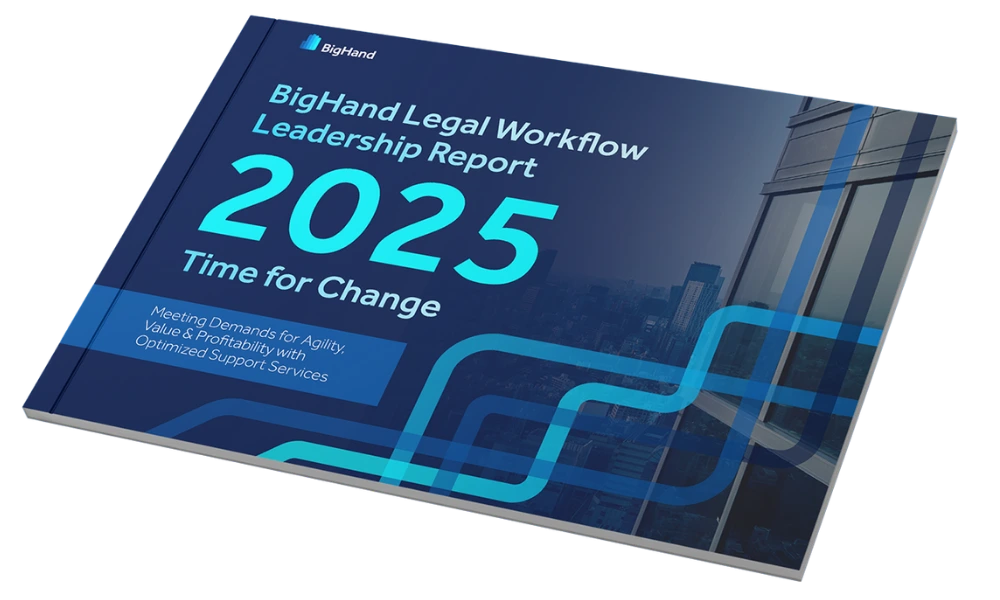Our latest report, BigHand Legal Workflow Leadership Report 2025 - shines a spotlight on support staff value. The data paints a compelling picture: law firms rely on support functions more than ever, and the time has come to use data to elevate their role and protect a support system that empowers lawyers to thrive.
High Attrition and Low Investment Are Holding Firms Back
Across the industry, legal support teams are under growing pressure. Attrition remains a major challenge, with only 13% of firms seeing a decrease in turnover in the past 12 months. One of the biggest contributors is a looming retirement wave - 41% of firms expect between 21 - 40% of their support staff to retire within five years.
However, this isn’t a distant issue - it’s already impacting operations. Nearly a third of firms (31%) report an increased reliance on lawyers to handle administrative work. However, while lawyers are highly skilled legal professionals, their time is best spent on billable activity and client work – not on support tasks that specialists are trained for. This mismatch creates inefficiencies, jeopardises client service, and ultimately impacts profitability – especially when non-billable time can’t be recovered.
Of course, when lawyers are spending more time on admin, they’re spending less time meeting targets, driving matter progression, or nurturing client relationships – all of which directly affect career development and wider law firm performance.
Compounding the issue, nearly 70% of firms rate the difficulty of replacing support roles as 5 or higher out of 10 - a clear sign that expertise is not easily replaced. However, the data shows how firms have work to do when it comes to retaining their top talent, with just 25% of firms having a clearly defined career path for support roles. When firms don’t invest in development and progression, they risk losing even more experienced professionals and the operational knowledge that enables matter delivery at scale.
Manual Delegation Is Failing You
Another challenge is the continued reliance on manual delegation. A staggering 87% of law firms still manage work allocation manually, whether teams are in the office or working remotely.
This outdated approach creates serious vulnerabilities. Without digital oversight, it’s all too easy for tasks to be duplicated, delayed, or completely missed. That directly impacts service quality, harms client satisfaction, and reduces the likelihood of repeat business. It’s also harder for lawyers to delegate work effectively, creating a bottleneck that eats into billable hours and adds pressure to already stretched teams.
What’s more, without structured, trackable delegation, firms can’t see where capacity lies or how to improve efficiency. That means missed opportunities to optimise workflows and deliver stronger client service.
When support functions are supported by clear, data-led delegation processes, everything changes. Lawyers pass on more work to support - rather than doing their own admin - and that work is distributed more effectively, bottlenecks are reduced, client satisfaction increases and the value of support staff becomes visible and measurable.
Elevating Value Through Technology
So, how can firms build on that value while making support staff’s roles more manageable and rewarding? The answer lies in Workflow Management technology.
Our report shows that 51% of firms already have workflow technology in place, with another 11% planning to implement. In brief, these systems streamline task allocation, provide real-time visibility, and generate data to inform staffing decisions and workload balance.
Workflow Management tools enable faster task turnaround, reduce reliance on overburdened individuals, and give lawyers confidence that the right work is in the right hands at the right time. Firms using this technology report higher productivity and improved profitability. It’s no surprise then that IT investment is on the rise, with top-performing firms increasing IT spend by 11.4%.
That’s not just a vote of confidence in digital transformation - it’s a clear sign that forward-thinking firms understand the value of efficient, data-led working.
The right workflow tools don’t just streamline how work gets done, they prove support staff impact by showing where time is spent, where efficiency can be gained, and how their role contributes directly to client service and the bottom line by maximising the profitability of the lawyers they support.
In short, Workflow Management technology translates efforts into evidence.
Start the Conversation
This report is an evidence base. Download it, read it and share it with firm leaders. Use it to champion the need for investment in development, in smarter ways of working, and in the technology that can transform day-to-day operations.
Support staff are a vital part of the firm’s success story. When they thrive, lawyers thrive too.








